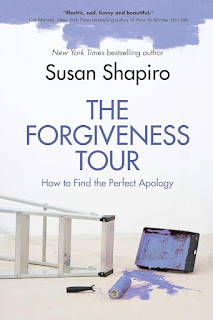Susan Shapiro is the author of the book The Forgiveness Tour: How to Find the Perfect Apology. Her many other books include Five Men Who Broke My Heart. She lives in Manhattan.
Q: What inspired you to write The Forgiveness Tour?
A: I felt slighted by an important mentor in my life and we had a falling out. When I told him I was upset and felt that I was owed an apology, he said “I’m sorry for the imaginary crime you think I committed,” which made me want to commit a real crime. He didn’t think he did anything wrong and showed no remorse.
I wondered - how can I forgive someone who doesn’t say they’re sorry? Does someone who shows no regret even deserve forgiveness? If not, how could I move on?
I wound up asking several religious leaders I knew what they thought. As I told friends and colleagues what happened, they shared horrific stories of apologies they deserved but never received and wrongs that were never righted.
When a short piece I wrote about it for Salon went viral and won an award, I realized I’d touched a universal nerve about forgiveness and apologies. So I kept asking questions and doing research - for 10 years! Until it felt like I could offer something wise and illuminating to add to the conversation.
Q: What do you see as the “perfect apology”?
A: In the book I cite four elements of an effective apology:
1) Saying you are sorry for what you did wrong very specifically, owning it and falling on your sword.
2) Explaining why it happened.
3) Showing how you understand the hurt you caused and how it will never happen again.
4) Offering reparations to fix what was broken.
Q: The Kirkus Review of the book said, “Enlightening and universally relevant, the book shows us how to forgive even when it might be impossible to forget.” What do you think of that description?
A: I love it - especially since Kirkus is known for harsh criticism. Although the book does not promote forgiving everyone everything. Actually the opposite, it shows idiosyncratic stories where forgiveness is impossible.
Manny, a Holocaust survivor, thrives out of spite. Kenan, a Bosnian Muslim victim of ethnic cleansing in the Balkan war, only heals through speaking out loudly about the atrocities his people suffered. Sharisse, who was raped by her father and pushed to forgive him as a teenager, posthumously un-forgave him in her 40s during our interview, which she found liberating.
I recently wrote a piece for The Washington Post about times it’s healthier not to forgive.
Q: What impact did it have on you to write the book, and what do you hope readers take away from it?
A: People ask me if spending a decade researching and writing about forgiveness made me more forgiving. I’d say no. Yet it did teach me how important a true, full-fledged apology can be. So I’d say I apologize more fully and better now, even in cases where I’m not sure I did something wrong.
But if I’ve upset or slighted someone I care about, I understand the power words have to heal. I hope readers come away understanding that, and are empowered by it, especially if they want to heal estrangements in their lives.
Q: What are you working on now?
A: I’m still doing events for The Forgiveness Tour, especially around the Jewish holidays. And there’s a special sale on Amazon for The Forgiveness Tour from October 2 to 15. And then my coauthored book American Shield comes out in paperback in November.
Q: Anything else we should know?
A: I’m now teaching my writing and publishing classes online, which has been an exciting change for a technophobe. People can email me at Profsue123@gmail.com for more info or follow on https://www.instagram.com/profsue123/
--Interview with Deborah Kalb


No comments:
Post a Comment